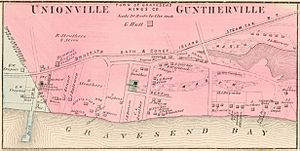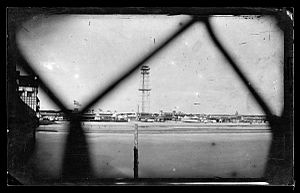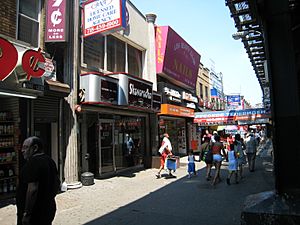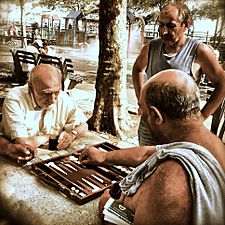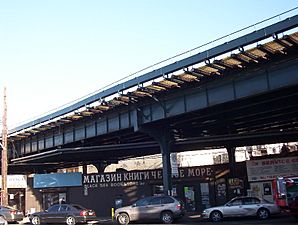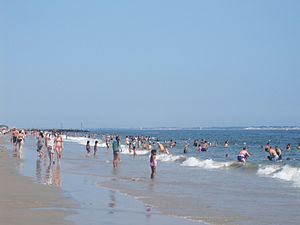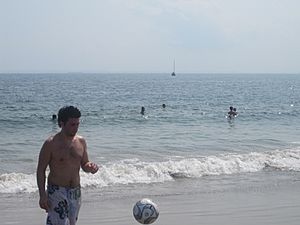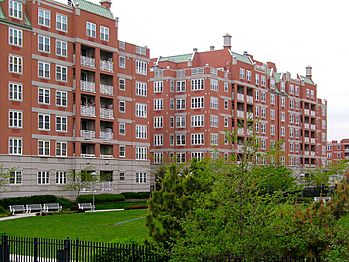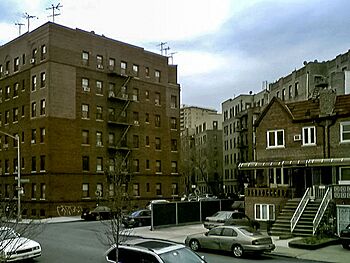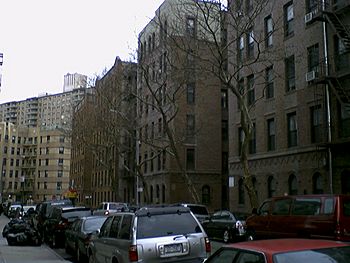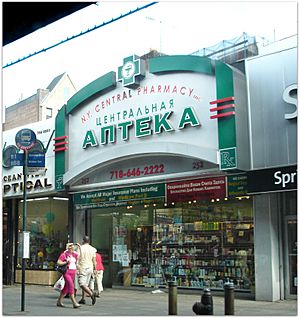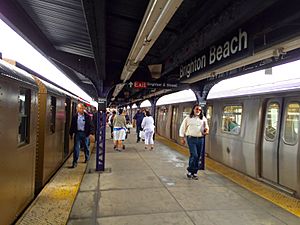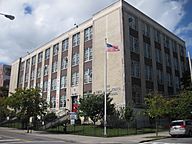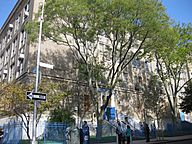Brighton Beach facts for kids
Quick facts for kids
Brighton Beach
|
|
|---|---|
|
Neighborhood in Brooklyn
|
|
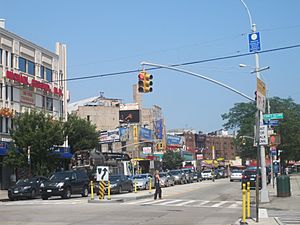
Looking east along Brighton Beach Avenue from the corner of Coney Island Avenue
|
|
| Nickname(s):
"Little Odessa"
|
|
| Country | |
| State | |
| City | New York City |
| Borough | Brooklyn |
| Community District | Brooklyn 13 |
| Founded | 1868 |
| Founded by | William A. Engeman |
| Population
(2010)
|
|
| • Total | 35,547 |
| Time zone | UTC−05:00 (Eastern) |
| • Summer (DST) | UTC−04:00 (EDT) |
| ZIP Code |
11235
|
| Area code | 718, 347, 929, and 917 |
Brighton Beach is a lively neighborhood in the southern part of Brooklyn, New York City. It's located near the Atlantic Ocean and the famous Coney Island area. Brighton Beach is known for its beautiful beaches and its close ties to the amusement parks in Coney Island.
This neighborhood is often called "Little Odessa" because many people who speak Russian have moved here. Brighton Beach is part of Brooklyn Community District 13. Its main ZIP Code is 11235. The local police department is the 60th Precinct of the New York City Police Department.
Contents
History of Brighton Beach
How Brighton Beach Started
The land where Brighton Beach now stands was bought from Native Americans in 1645. Before the 1860s, this sandy area was mostly farmland.
In 1868, a man named William A. Engeman built a resort here. In 1878, he and other businessmen named the area "Brighton Beach." They chose this name because it sounded like the popular English resort city of Brighton. Engeman bought all the land for a low price.
He built a large hotel called "Hotel Brighton" or "Brighton Beach Hotel." It could host thousands of people. A big bathing pavilion was also built nearby for swimmers. The Brooklyn, Flatbush, and Coney Island Railway opened in 1878. This train line made it easy for people to visit the hotel.
Engeman also built the Brighton Beach Race Course for horse racing. In 1887, a very high tide caused flooding. The hotel was in danger of being washed away. So, in 1888, the hotel was moved 495 feet further inland. This was a huge engineering feat for its time!
Brighton Beach became a popular spot for entertainment. Famous musicians and opera singers performed here. There were also vaudeville shows and a large private club called the Brighton Beach Baths. In 1894, Brighton Beach became part of the City of Brooklyn.
Brighton Beach in the 1900s
In 1905, Brighton Beach Park opened with its own rides and shows. It had a boardwalk, games, and a big roller coaster. The park closed in 1919 after a fire. However, the beach itself stayed popular.
Around 1920, the Brighton Beach railway was updated for faster trains. This made Brighton Beach a place where people could live all year. But it also meant visitors could go home easily, so the Brighton Beach Hotel closed in 1924.
Before and after the Great Depression, many Jewish-American families moved to Brighton Beach. This included survivors of the Holocaust. In 1919, the New Brighton Theater became the first Yiddish theater in the United States. Today, Brighton Beach has many synagogues and Jewish centers.
Recent History and Immigration
After World War II, Brighton Beach faced some challenges. The number of older residents grew, and poverty increased. In the 1970s, many people moved to the suburbs.
In the mid-1970s, Brighton Beach became a popular home for immigrants from the Soviet Union. Most of these were Jewish people from Russia and Ukraine. So many Soviet Jews moved here that the area became known as "Little Odessa".
When the Soviet Union broke apart in 1991, even more people from former Soviet countries came to the United States. Many of them, who mostly spoke Russian, chose to live in Brighton Beach. This included immigrants from places like Georgia and Azerbaijan.
Many Russian-speaking businesses, shops, and restaurants opened in the area. In the early 2000s, a fancy apartment complex called "Oceana" was built. This led to higher housing prices in the neighborhood. Since the 2010s, many immigrants from Central Asia have also moved to Brighton Beach.
Brighton Beach Culture
Brighton Beach Avenue runs next to the Coney Island beach and boardwalk. Because it's close to the beach and has a subway station, it's a popular place to visit in the summer.
- Brighton Beach's culture
- Brighton Beach housing
Russian-Speaking Culture
As more apartment buildings were built in the 1930s, many Jewish immigrants from Eastern Europe moved to Brighton Beach. This prepared the way for a later wave of Jewish immigrants from the Soviet Union in the 1970s. That's when Brighton Beach became known as "Little Odessa" or "Little Russia."
An annual event called the Brighton Jubilee celebrates the area's Russian-speaking heritage. Many Russian and Ukrainian Americans live here. The area is known for its many shops and foods from former Soviet countries.
In 2006, Alec Brook-Krasny was elected to the New York State Assembly. He was the first elected politician born in the Soviet Union in the United States.
Population and Diversity
Brighton Beach has a diverse population. In 2010, about 35,547 people lived here. Most residents are White, with a growing number of Asian residents. About 14.6% of the population is Hispanic or Latino.
In the 1980s, many older, mostly Jewish, people lived in Brighton Beach. But since the 1990s, more immigrants from Central Asia have moved in. Many of these new residents also speak Russian due to the history of Soviet influence in their home countries.
Most people in Brighton Beach are immigrants. Less than a quarter of residents were born in the United States. Because of this, many people in Brighton Beach do not speak or understand English well.
Theater and Arts
The Brighton Ballet Theater started in 1987. It is a famous Russian ballet school in the United States. Thousands of children have learned ballet and other dances here.
There is also a Russian-speaking theater called the Master Theater. It used to be called the Millennium Theater. Actors from the U.S., Russia, and other countries perform there.
Community Services
Fire Safety
The New York City Fire Department (FDNY) has a fire station in Brighton Beach. It is located at 2732 East 11th Street.
Post Office and ZIP Code
Brighton Beach's ZIP Code is 11235. The United States Postal Service has a post office called Brighton Station at 3157 Coney Island Avenue.
Parks and Recreation
The New York City Department of Parks and Recreation manages several public parks in Brighton Beach:
- The Coney Island Boardwalk and Beach run along the coast south of Brighton Beach.
- Brighton Beach Playground is on the Boardwalk at Brighton 2nd Street. It was built in 1950.
- Asser Levy Park is near the Boardwalk between Surf Avenue and Sea Breeze Avenue.
- Century Playground was built in the 1960s.
- Grady Playground has baseball fields, basketball courts, and playgrounds.
- Babi Yar Triangle is a small park at Brighton 14th Street. It honors the victims of the Babi Yar massacre.
Transportation
The New York City Subway serves Brighton Beach. You can take the B and Q train train at the Brighton Beach and Ocean Parkway stations. These stations are on an elevated track above Brighton Beach Avenue. Several bus lines also serve the neighborhood, including the B1, B4, B36, B68.
Education
Schools in Brighton Beach
The New York City Department of Education manages the schools in Brighton Beach.
- P.S. 225 The Eileen E. Zaglin School serves students from kindergarten to 8th grade.
- P.S. 253 the Ezra Jack Keats International School is another primary school.
- William E. Grady CTE High School is a vocational school in Brighton Beach.
- Nearby high schools include Abraham Lincoln High School in Coney Island.
Library Services
The Brooklyn Public Library has a branch in Brighton Beach. It is located at 16 Brighton First Road. This library has a large collection of books and other materials in Russian. The branch opened in 1949 and moved to its current, larger location in 1964.
Notable People from Brighton Beach
Many interesting people have lived in Brighton Beach:
- Marv Albert (born 1940), a famous sportscaster.
- Neil Diamond (born 1941), a well-known songwriter and musician.
- Jack Kirby (1917–1994), a famous comic book artist who helped create characters like Captain America and the Fantastic Four.
- David Julius (born 1955), a Nobel Prize winner.
- Neil Sedaka (born 1939), another popular songwriter.
- Peter Steele (1962–2010), the lead singer of the band Type O Negative.
- Boris Thomashefsky (1866–1939), a big star in Yiddish theater.
- The Tokens, a vocal group formed at Abraham Lincoln High School.
Also, a local character known as Disco Freddy (or Larry the Unbelievable) was famous on the Riegelmann Boardwalk in the late 1970s and early 1980s.
Images for kids
See also
 In Spanish: Brighton Beach para niños
In Spanish: Brighton Beach para niños
 | Selma Burke |
 | Pauline Powell Burns |
 | Frederick J. Brown |
 | Robert Blackburn |


